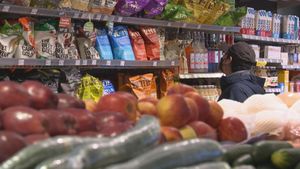The dynamics of family formation are changing across the UK, as more single women and female couples are embracing fertility treatments such as IVF (in vitro fertilisation) and donor insemination. A recent report from the Human Fertilisation and Embryology Authority (HFEA) reveals some compelling statistics: between 2012 and 2022, the number of single women undergoing these treatments has skyrocketed from 1,400 to 4,800, representing a staggering 243% increase.
Sarah Glover, who recently welcomed her son Oliver at age 56, is among this growing demographic. Her story reflects both the joys and the challenges of becoming a mother without a partner. Sarah’s time traveling and experiencing life led her to delay parenthood until she felt ready. “Since my early forties, I’d been trying to meet someone on dating sites, but when I told them I wanted a child, it became harder,” she recalls.
The increase isn't solely limited to single women; female couples seeking IVF treatments have also seen significant growth, jumping from 1,300 to 3,300 over the same decade. Interestingly, though heterosexual couples still represent the largest category of individuals seeking fertility treatments, single women and same-sex couples now account for approximately one out of every six treatments.
Despite the uptick in demand for fertility treatments, there are significant hurdles. HFEA has noted how financial limitations can create barriers—many women, particularly single individuals, must demonstrate infertility before qualifying for NHS-funded IVF. This often proves to be financially taxing, forcing them to turn to private options. Most single women and female couples are left to cover substantial medical costs out of pocket.
This situation is mirrored by advocacy groups like Fertility Network UK, which emphasizes the need for systemic change. They point out the disappointing trend where NHS funding for fertility treatments is significantly less available for single women and female same-sex couples compared to heterosexual couples. For example, just 18% of single patients and 16% of lesbian couples had NHS funding for their first IVF treatment, contrasted with 52% for heterosexual couples aged 18 to 39.
Julia Chain, chair of the HFEA, commented on the shifting tides of family dynamics: “While the numbers continue to rise for female same-sex couples and single patients seeking fertility treatments, we still witness lower NHS funding rates.” She stressed the importance of reviewing eligibility criteria to avoid adverse impacts on access.
One notable trend over the years has also been the rise of egg freezing, where single women now represent 89% of egg storage procedures performed between 2018 and 2022. This method allows women to plan for future pregnancies by preserving their eggs, often seen as a proactive step against declining fertility with age.
Returning to Sarah Glover's experience, after initially attempting treatments, she undertook extensive IVF and donor insemination, accumulating costs above £50,000, significantly assisted by her inheritance. Her determination to become a mother, stemming from her burnt yearning for parenthood, paved the way for her eventual success.
“I realized this desire wasn’t going away,” she explained. “I gave it one last shot.” Her story is punctuated by the courage and dedication of women who defy traditional narratives of family creation, choosing independence amid societal expectations.
It’s worth noting, though, amid these advancements, the fertility industry is not without criticism. Concerns about the commercialization of fertility treatments have been raised, with many clinics accused of exploiting the vulnerability of hopeful parents by offering additional procedures and services—often at inflated costs.
Even as women become more empowered and take greater control of their reproductive paths, there are still universal obstacles tied to affordability and fairness. Not only has the financial pressure increased for these family types, but there are additional societal perceptions to navigate.
The shift also highlights changing societal attitudes toward non-traditional family configurations; women are now more inclined to bypass conventional dating and partnerships to achieve their goals of motherhood.
Zoe Williams, columnist for The Guardian, articulates this transformation effectively, stating, “Women have climbed steadily from waiting for the right partner to choosing parenthood independently. This demonstrates increasing confidence and agency.” Unlike previous generations, today’s independent women are increasingly unafraid to take matters—especially concerning family planning—into their own hands.
Through Sarah's personal narrative and the national statistics, it becomes evident that's there’s no one-size-fits-all approach to family life anymore. Modern partnerships can assume various forms, and motherhood has become attainable for many through alternative avenues. This change has ushered in broader discussions around reproductive rights, access to fertility services, and the policies governing them.
With these developments, it’s clear the future of fertility treatments must also evolve. Advocacy for inclusive policies means amplifying women's voices and experiences like Sarah Glover’s. Their journeys collectively reflect the need for equality and support across all family types, ensuring financial and medical barriers are dismantled for those who seek the fulfilling experience of motherhood, regardless of their relationship status.
While the statistics imply remarkable progress, the challenges facing single women and female couples remain substantial. It’s not just about increasing access to treatments; it’s about reshaping how society views family structures, fertility choices, and the paths women take to motherhood.



